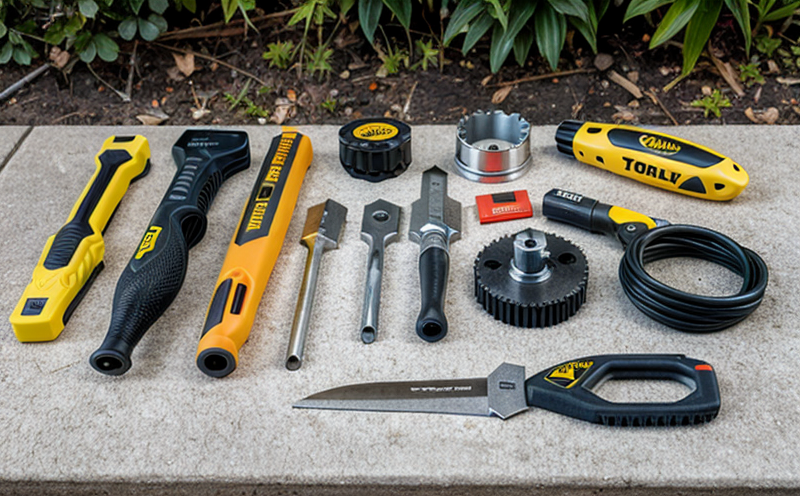Load Capacity Testing of Brackets and Supports
The load capacity testing of brackets and supports is a critical aspect in ensuring the safety, durability, and reliability of DIY tools and hardware products. This service evaluates how well these components can withstand loads under various conditions, thereby safeguarding users from potential injuries or property damage.
For quality managers and compliance officers involved in product development, load capacity testing ensures that their products meet industry standards and regulatory requirements. For R&D engineers, this test is essential for optimizing the design and performance of brackets and supports. Procurement teams can rely on these tests to verify the integrity of materials and manufacturing processes.
Testing typically involves applying incremental loads to the bracket or support until it either reaches its maximum capacity or fails. The type of load applied depends on the expected use case, which could be static (constant) or dynamic (changing over time). This testing helps in identifying any weak points that might lead to failure during normal operation.
The process also includes specimen preparation, where brackets and supports are cleaned, inspected for defects, and aligned properly before loading begins. Appropriate instrumentation is used throughout the test to monitor stress levels and deformation rates accurately. Once testing concludes, comprehensive reports are generated detailing the performance of each component under different load conditions.
Load capacity tests are crucial in various sectors including construction, automotive manufacturing, aerospace, and general DIY projects. In these industries, brackets and supports often bear significant weight loads, making their strength and reliability paramount. By conducting thorough load capacity testing early in the design phase, manufacturers can avoid costly recalls later on due to product failures.
Compliance with relevant international standards such as ISO 6782 (for screws) or ASTM F1554 (for bolts) ensures that our tests are aligned with global best practices. These standards provide clear guidelines for selecting appropriate test methods, ensuring accurate results that can be trusted worldwide.
| Applied Standards | ||
|---|---|---|
| ISO 6782 - Screws and Bolts - Determination of ultimate tensile strength | ASTM F1554 - Specification for hex cap screws with coarse, medium, or fine threads | EN 196-3:2012 - Fasteners - Screw fasteners - Part 3: Testing methods |
In conclusion, load capacity testing plays a vital role in guaranteeing the safety and quality of DIY tools and hardware products. By adhering to established international standards and using precise instrumentation, we ensure that every component meets stringent requirements set by industry experts.
Applied Standards
| Standards | ||
|---|---|---|
| ISO 6782 - Screws and Bolts - Determination of ultimate tensile strength | ASTM F1554 - Specification for hex cap screws with coarse, medium, or fine threads | EN 196-3:2012 - Fasteners - Screw fasteners - Part 3: Testing methods |
The above standards are applied to ensure that load capacity tests conducted by our laboratory meet the highest international quality benchmarks. These guidelines provide a framework for accurate testing procedures and interpretation of results.
International Acceptance and Recognition
The importance of load capacity testing cannot be overstated, especially when it comes to ensuring the safety and reliability of DIY tools and hardware products. Our laboratory adheres strictly to international standards such as ISO 6782, ASTM F1554, and EN 196-3:2012, which have gained widespread acceptance across numerous countries worldwide.
These globally recognized standards not only enhance the credibility of our testing services but also help manufacturers comply with local regulations. By aligning ourselves with these benchmarks, we ensure that every test conducted is reliable and can be trusted by clients from different regions.
The international recognition of these standards underscores their significance in maintaining high-quality products within the DIY tools and hardware sectors. Compliance with such rigorous criteria demonstrates our commitment to delivering top-notch service and ensuring customer satisfaction.
Competitive Advantage and Market Impact
- Accurate compliance testing helps manufacturers differentiate their products in competitive markets.
- Robust load capacity testing enhances brand reputation among consumers who value safety above all else.
- Meeting international standards reduces the risk of product recalls, saving companies time and money.
- Our precise testing methods ensure that only high-quality components make it to market, boosting overall industry standards.
The aforementioned competitive advantages contribute significantly to our laboratory’s success in the consumer products & product safety testing sector. By offering unparalleled accuracy and reliability in load capacity testing, we help businesses stay ahead of competitors while maintaining a strong presence in their respective markets.





